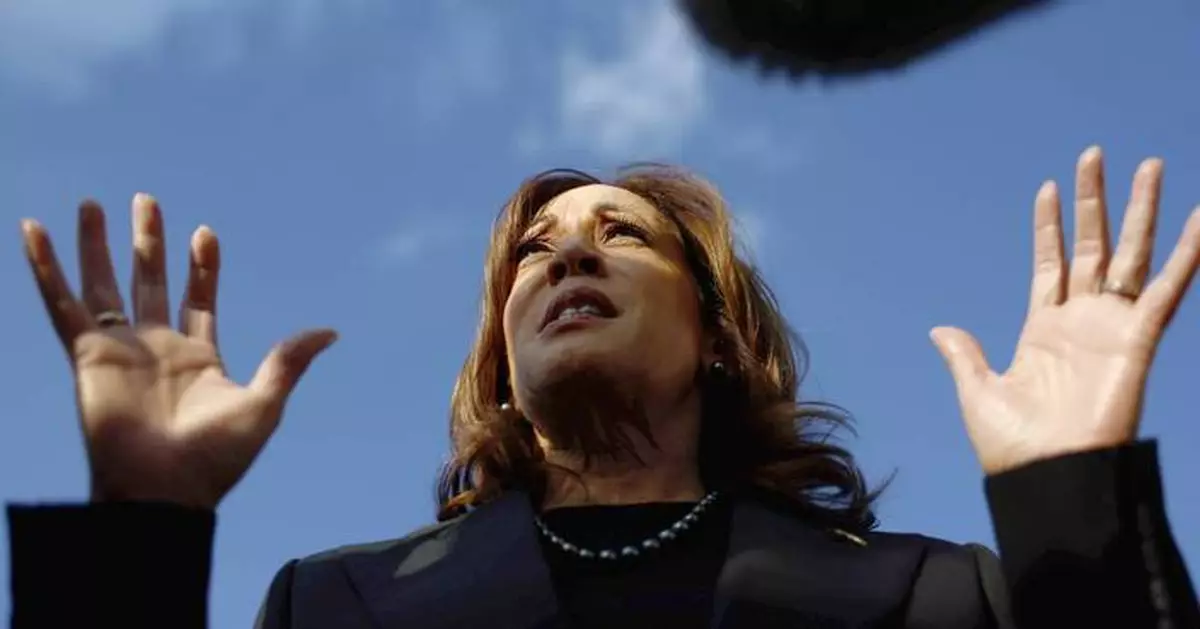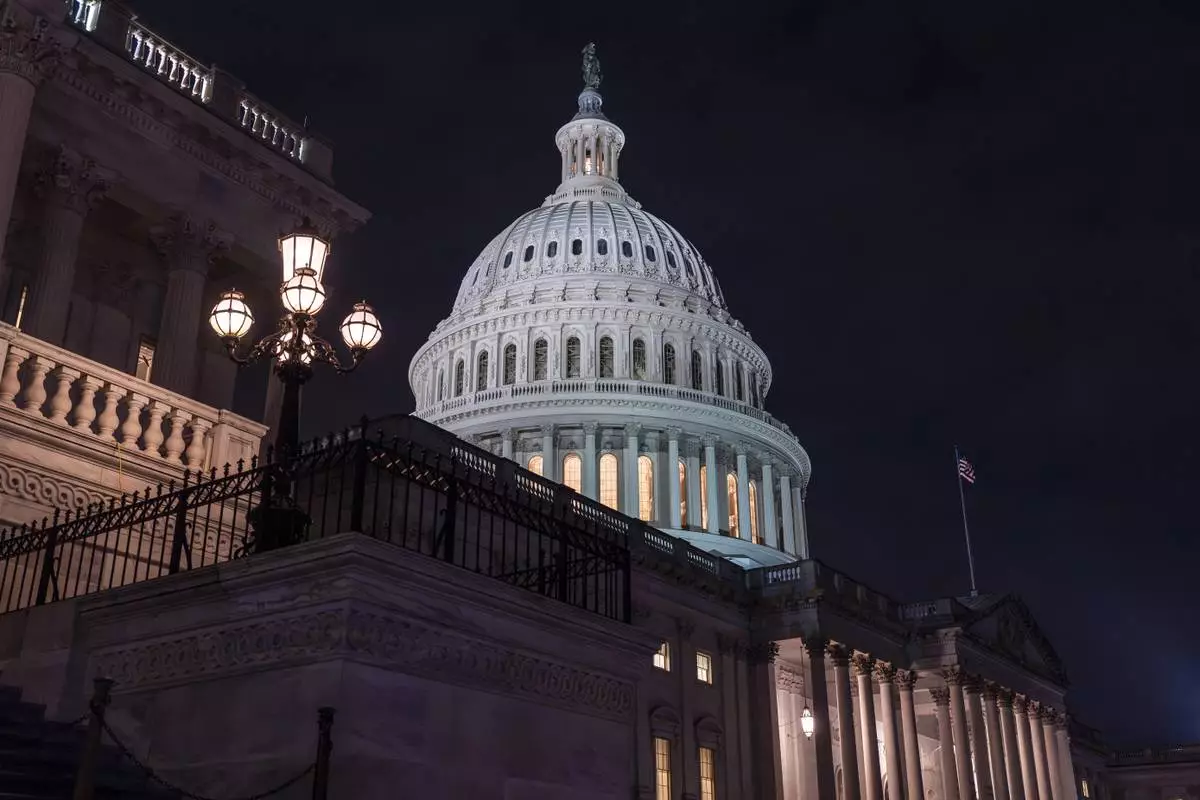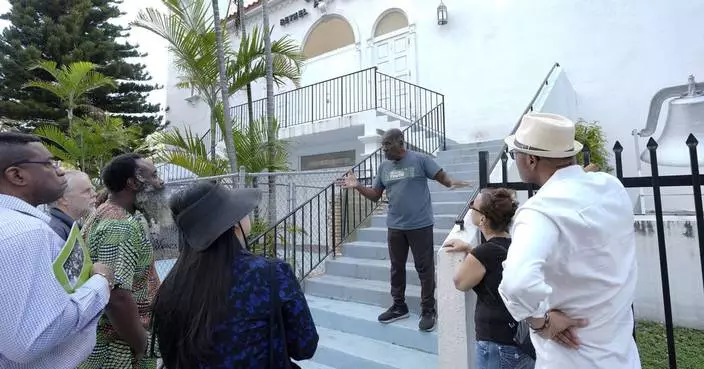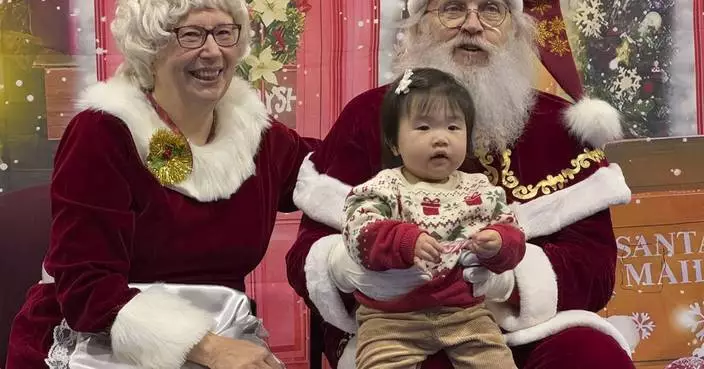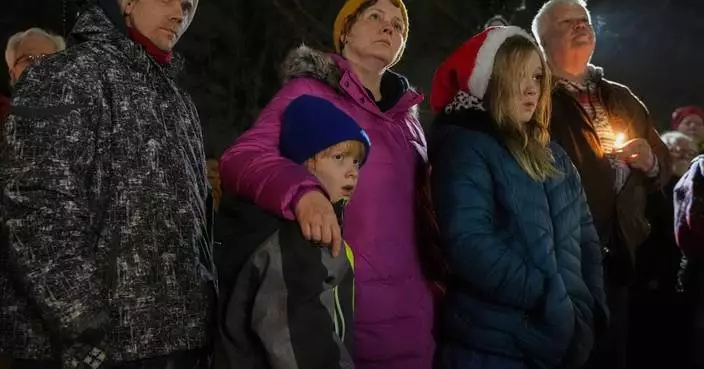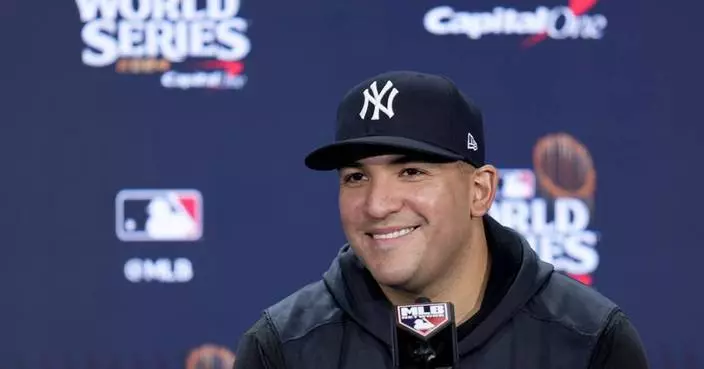NEW YORK (AP) — Kamala Harris wanted to help voters get to know her better with a cascade of media appearances Tuesday, but the most lasting impression might have been her unwillingness to break with Joe Biden.
Asked on ABC’s “The View” how she would be different from the president she’s served under for four years, Harris said “we’re obviously two different people” and “I will bring those sensibilities to how I lead.”
However, she was not able to identify a decision where she would have gone another way. “There is not a thing that comes to mind,” Harris said.
The exchange encapsulated Harris’ struggle to portray herself as a candidate who can deliver the change voters crave while also remaining loyal to the current administration. Some Harris aides privately winced as gleeful Republicans swiftly circulated clips of her response and Donald Trump swiped at her in a social media post, calling it “her dumbest answer so far.”
It wasn’t until later in the show that Harris named something that she would do differently than Biden — she would put a Republican in her Cabinet.
The Democratic nominee said she would welcome contributions from the other party “because I don’t feel burdened by letting pride get in the way of a good idea.”
The interview was a reminder that friendly media venues — the women of “The View” were nearly rapturous in their embrace of Harris — can be as treacherous for politicians to navigate as hardball journalistic interrogations. And it came at a delicate moment for Harris, whose motorcade whisked her from studio to studio in New York on Tuesday.
She faced a similar question during a taping of CBS' “The Late Show with Stephen Colbert, who asked Harris ”what would the major changes be" from Biden. She offered nothing other than saying “I’m obviously not Joe Biden, so that would be one change" — then emphasized that she's also not Trump.
Even though Harris' abbreviated and unexpected bid for the presidency is more than half over, she is still racing to introduce herself to voters who haven’t made up their minds about her or whether to cast ballots in this year’s election. Her interviews Tuesday, which included sitting down with radio host Howard Stern, were an attempt to reach as many people as possible with only four weeks to go until the end of the campaign. She also recently spoke to CBS’ “60 Minutes,” which aired Monday night, and Alex Cooper’s podcast “Call Her Daddy,” which was released Sunday.
It's a kaleidoscopic media blitz intended to reach key demographics, from men who are longtime fans of Stern to young women who follow Cooper's frank conversations about sex and relationships.
Harris' decision to open up is a sharp shift after largely avoiding interviews since replacing Biden at the top of the ticket, and it’s an acknowledgment that she needs to do more to defeat Trump.
Getting personal has never been easy for Harris, a lawyer by training whose first job in public life was making opening and closing arguments as a courtroom prosecutor.
“It feels immodest to me to talk about myself,” Harris said to Stern. “A friend of mine actually said, ‘Look, this is not a time to worry about modesty, because obviously you gotta let people know who you are.’”
By the time she was finished with the interview, Harris had, by her standards, bared her soul. Some examples:
She ate a family sized bag of Doritos after Trump beat Hillary Clinton. She works out on an elliptical every day. Her first job was cleaning test tubes at her mother’s laboratory, and she got fired. Her favorite Formula One driver is Lewis Hamilton. She went to see U2 at the Sphere in Las Vegas, and she recommends going with a “clear head,” meaning not high on drugs, because “there’s a lot of visual stimulation.”
Harris also said “I literally lose sleep” over the election because “the stakes are so high.”
Anna Greenberg, a Democratic pollster, said Harris has to energize people who have tuned out politics because they believe “all the politicians are the same, they all say the same thing, they don’t know anything about my life, I can’t relate to them at all."
“They want to like and trust you," she said.
As if to drive the point home, Colbert’s show included a very literal riff on the old political adage that Americans want politicians that they could have a beer with, and he pulled out two cans of Miller High Life.
Harris took a sip and said the last time she had drunk beer was at a baseball game with her husband.
Jennifer Harris, the former White House senior director of international economics, said Harris has a steeper hill to climb because of the way she became the Democratic nominee.
“We did not have a good long primary to meet Kamala Harris in the way most voters are accustomed to,” she said. Harris has to find a way to demonstrate the instincts and principles that ”will be guiding any number of hundreds of specific policy questions that will come up in the course of the presidency.”
Harris used her Tuesday appearance on “The View” to discuss her proposal to have Medicare cover in-home care for the elderly, helping to relieve the burden faced by an increasing number of families.
She spoke about taking care of her own mother when she was dying of cancer, including cooking for her and picking out soft clothing that wouldn't irritate her. And she criticized Trump as selfish and uninterested in helping Americans. If you watch his grievance-filled rallies, she said, “he does not talk about what your parents need, what your children need.”
Instead, Harris said, “he talks about his needs.”
It was a moment that Harris' campaign would much rather get noticed than her answer about Biden. They believe that a small yet pivotal numbers of undecided voters want to know more about Harris before making up their minds, and that the more those voters see Harris, the more they like her.
Republican communications strategist Kevin Madden said defining Harris in voters' eyes is the central challenge of the campaign.
“This race is actually pretty simple in the sense that the next few weeks are about who’s going to fill in the blanks on who Harris is,” he said.
Harris' name recognition grew when she became vice president, but 1 out of 10 people still said they didn't know enough about her to have an opinion, according to AP-NORC polling. Recent shifts in her favorability numbers suggest that views on Harris may still be somewhat malleable.
Other polls have similar results. One-quarter of likely voters said they still feel like they need to learn more about Harris, according to a New York Times/Siena College poll conducted after her debate against Trump, while about three-quarters say they pretty much already know what they need to know about her.
Near the end of Harris' interview on the “Call Her Daddy” podcast, Cooper confronted the vice president with one of the central questions of this campaign.
So many people, Cooper said, are “frustrated and just exhausted with politics in general," so "why should we trust you?”
Harris answered by saying “you can look at my career to know what I care about.”
“I care about making sure that people are entitled to and receive the freedoms that they are due," she said. "I care about lifting people up and making sure that you are protected from harm.”
Megerian reported from Washington. AP writer Linley Sanders in Washington contributed to this report.
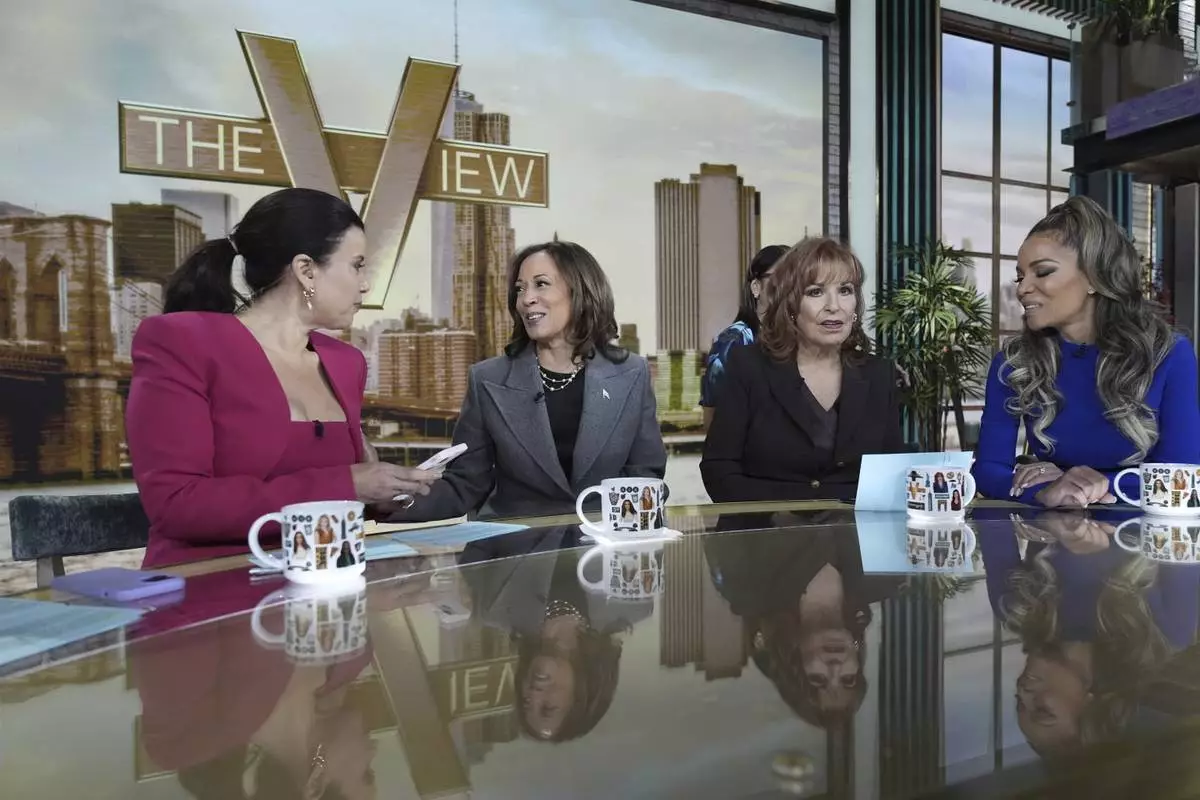
Democratic presidential nominee Vice President Kamala Harris chats with the hosts during a commercial break at The View, Tuesday, Oct. 8, 2024, in New York. Seated from left are Ana Navarro, Harris, Joy Behar and Sunny Hostin. (AP Photo/Jacquelyn Martin)
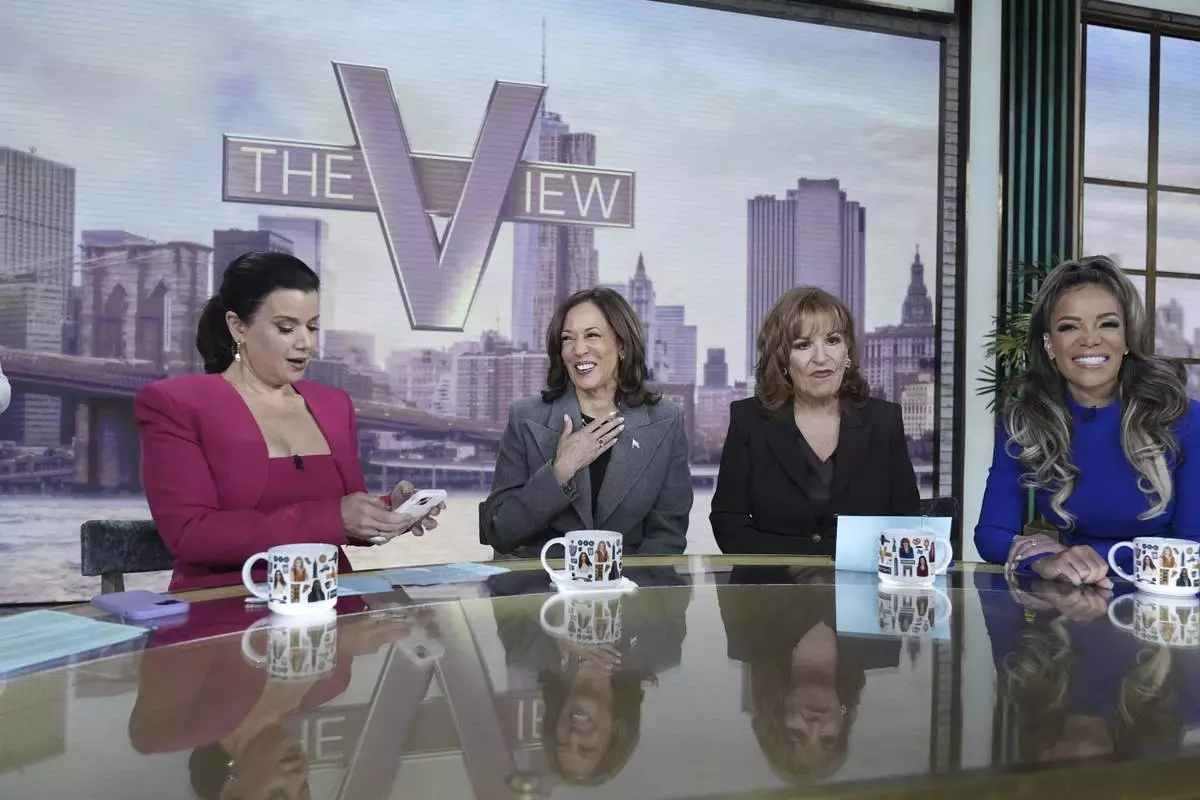
Democratic presidential nominee Vice President Kamala Harris chats with the hosts during a commercial break at The View, Tuesday, Oct. 8, 2024, in New York. From left are Ana Navarro, Harris, Joy Behar and Sunny Hostin. (AP Photo/Jacquelyn Martin)
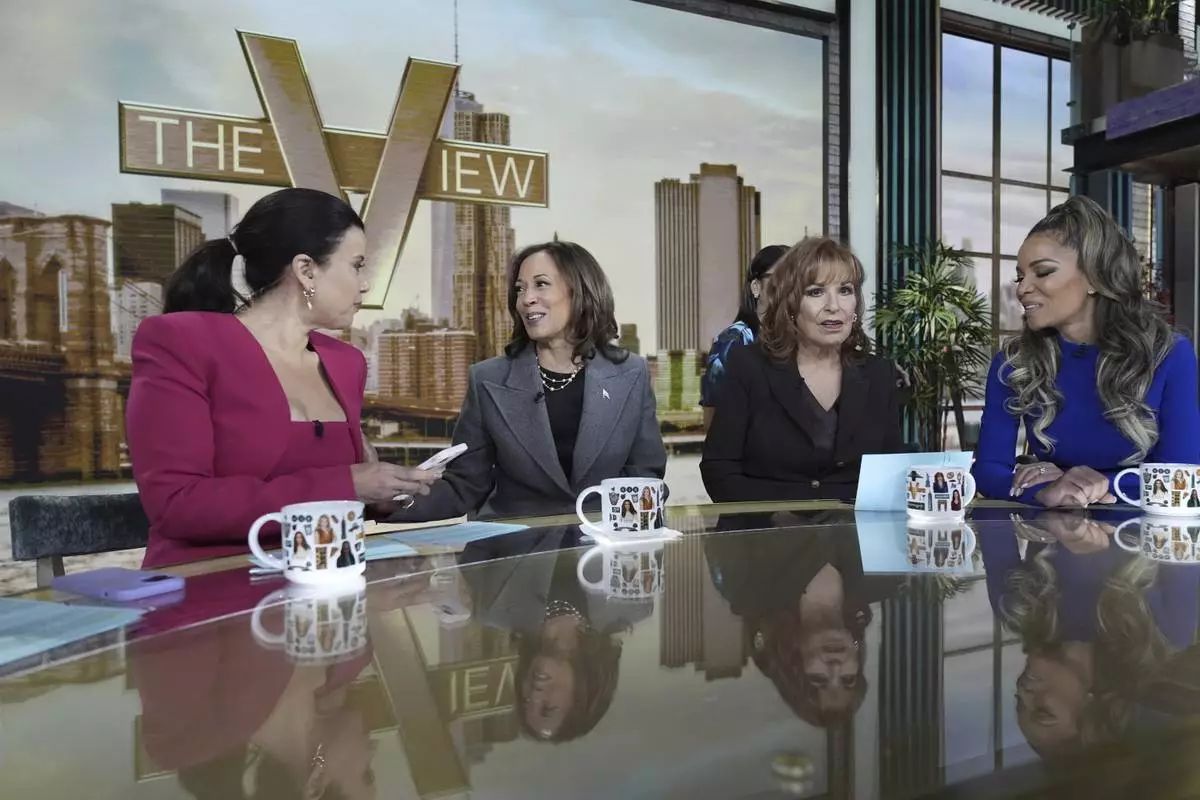
Democratic presidential nominee Vice President Kamala Harris chats with the hosts during a commercial break at The View, Tuesday, Oct. 8, 2024, in New York. Seated from left are Ana Navarro, Harris, Joy Behar and Sunny Hostin. (AP Photo/Jacquelyn Martin)
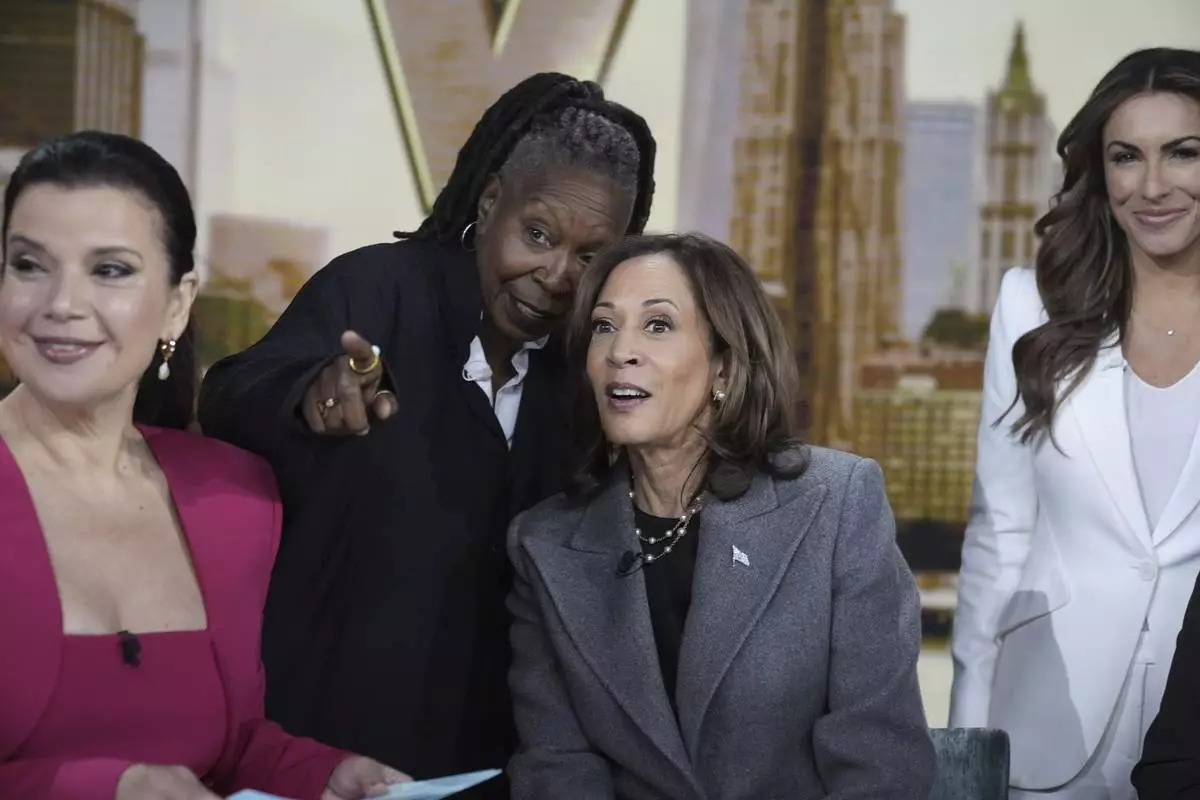
Democratic presidential nominee Vice President Kamala Harris chats with the hosts during a commercial break at The View, Tuesday, Oct. 8, 2024, in New York. From left are Ana Navarro, Whoopi Goldberg, Harris and Alyssa Farah Griffin. (AP Photo/Jacquelyn Martin)
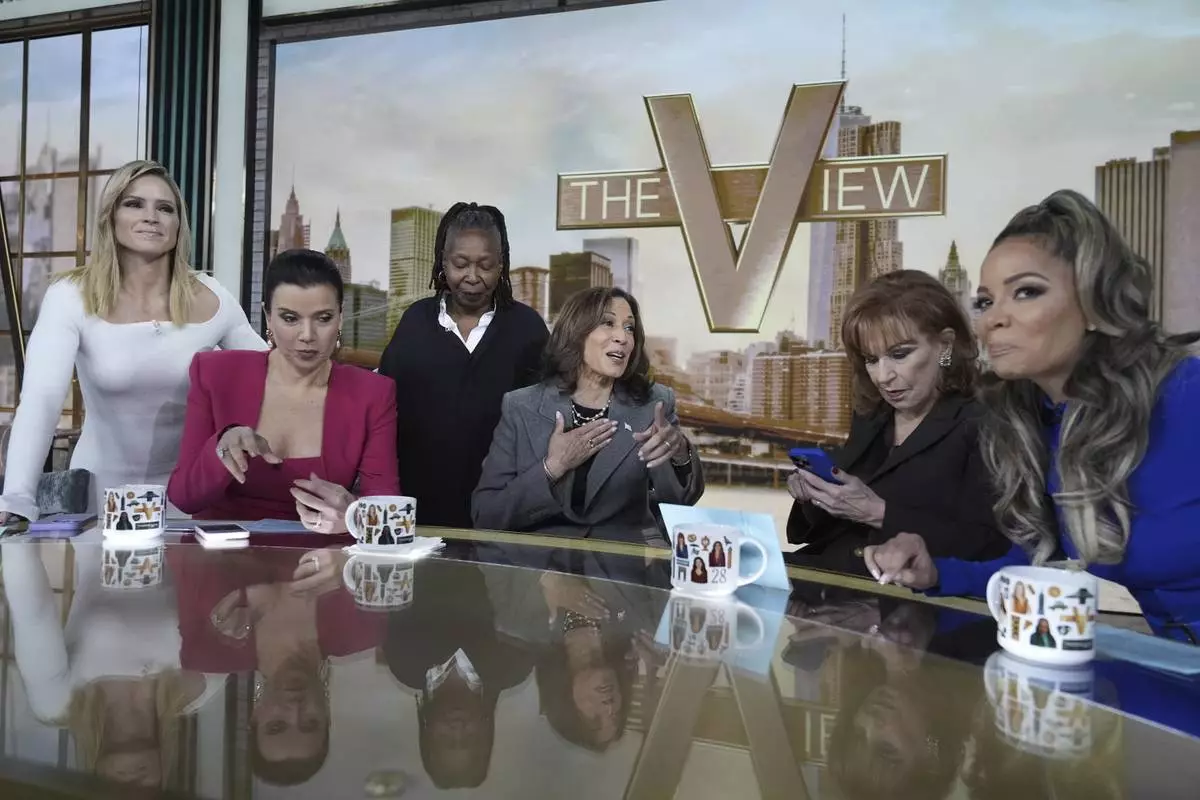
Democratic presidential nominee Vice President Kamala Harris chats with the hosts during a commercial break at The View, Tuesday, Oct. 8, 2024, in New York. From left are Sara Haines, Ana Navarro, Whoopi Goldberg, Harris, Joy Behar and Sunny Hostin. (AP Photo/Jacquelyn Martin)
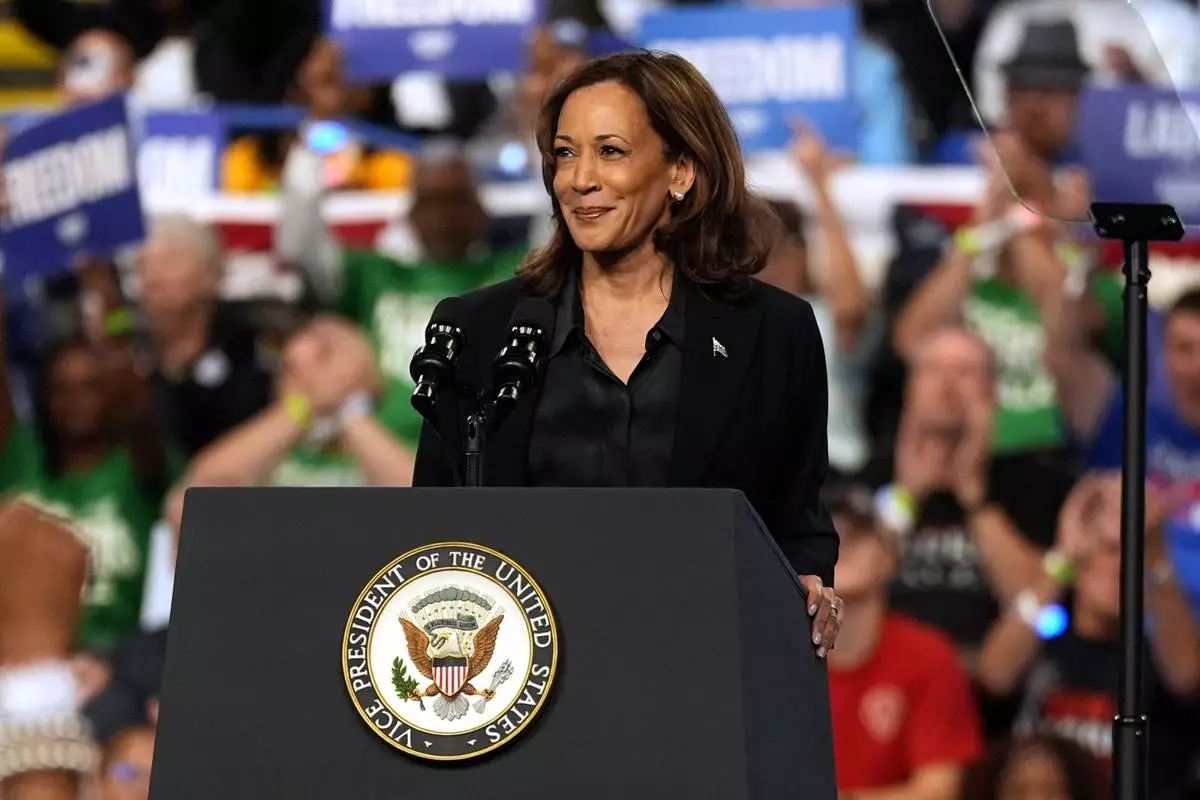
Democratic presidential nominee Vice President Kamala Harris speaks during a campaign rally at the Dort Financial Center in Flint, Mich., Friday, Oct. 4, 2024. (AP Photo/Carolyn Kaster)
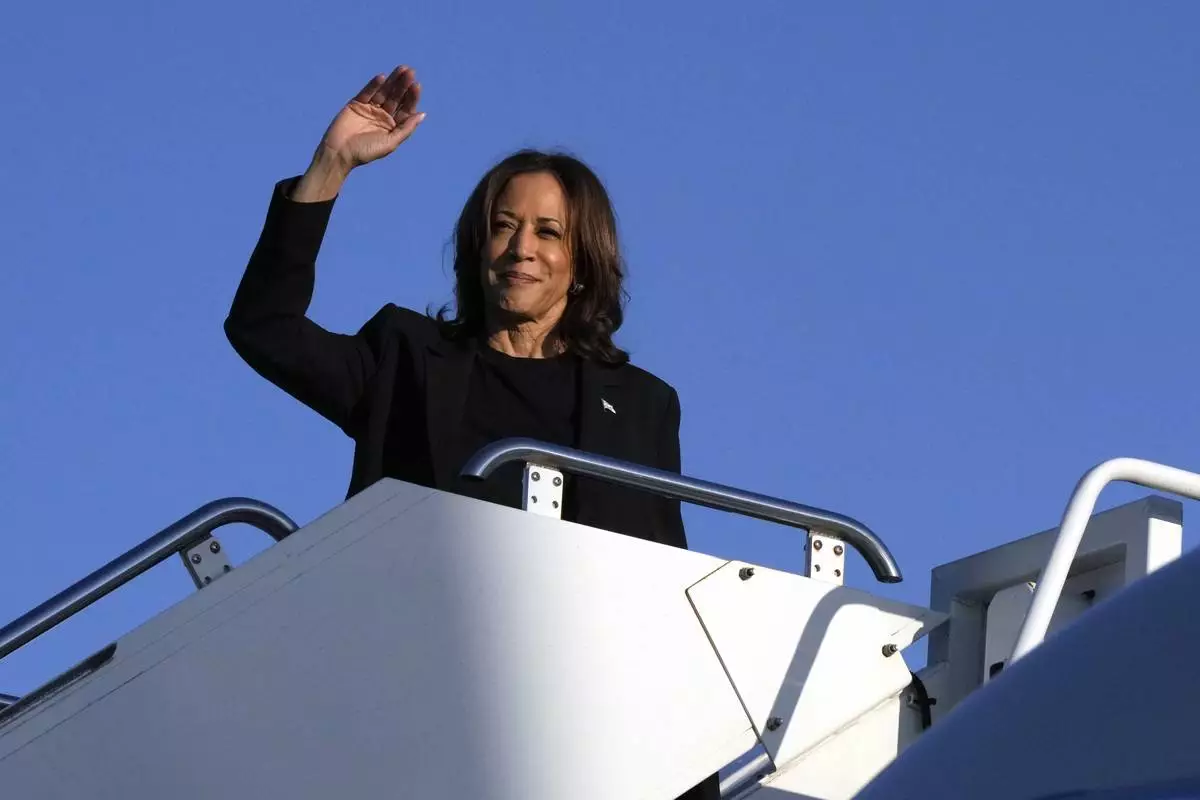
Democratic presidential nominee Vice President Kamala Harris boards Air Force Two at Charlotte Douglas International Airport, Saturday, October 5, 2024, in Charlotte, N.C., after a briefing on the damage from Hurricane Helene. (AP Photo/Chris Carlson)
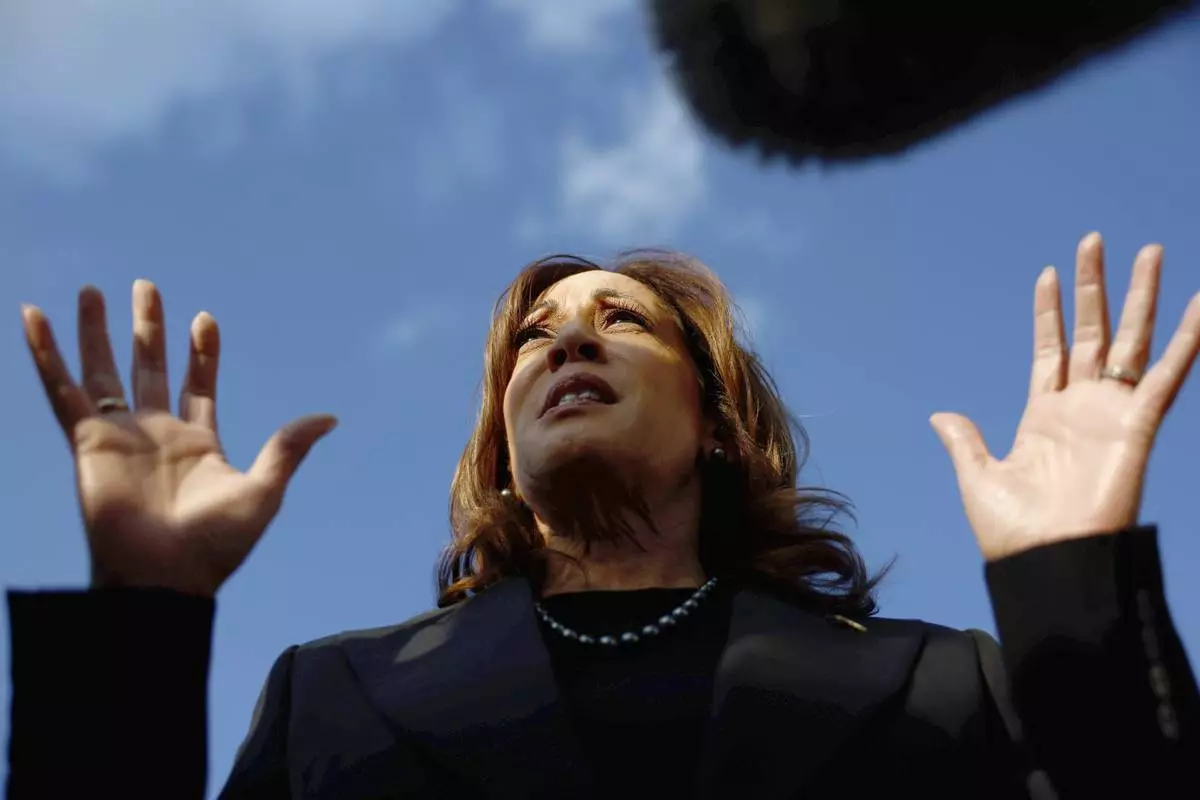
Democratic presidential nominee Vice President Kamala Harris speaks to reporters before boarding Air Force Two to depart for New York at Joint Base Andrews, Md., Monday, Oct. 7, 2024. (Evelyn Hockstein/Pool via AP)


